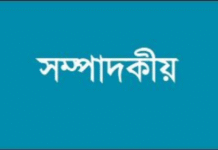| In the middle of a battle for the very identity of Bangladesh, growing unrest cuts across political, social and religious divides. Security forces are accused of mass killings as opposition allies turn against the government. |
Bangladeshi opposition parties have called for a two-day nationwide shutdown on Wednesday. It is in protest at what they describe as the massacre of protesters during demonstrations in the capital Dhaka.
It is the latest test for a government under growing pressure from opposition groups.
War crimes hearings in January and February resulted in two members of Jamat-e-Islami being sentenced to death, for crimes committed during the 1971 war of independence.
Activists and bloggers supported the death sentence, but thousands protested against the verdict.
Thirty days have been lost to strikes this year. Some shutdowns were in response to opposition demands that year-end elections be supervised by a neutral, caretaker government.
A building with garment factories inside collapsed last month. The number of people killed is now over 700, in what has become Bangladesh’s worst-ever industrial accident.
The latest protests were led by Hifazat-e-Islam. The group, made up of teachers and students from religious schools, wants to impose a stricter form of Islam to include a new anti-blasphemy law, compounding the chaos, and drawing a tough response from security forces.
Bangladesh has had a difficult birth, and a troublesome time since.
The Indian subcontinent was partitioned following the end of British colonial rule in 1947, and the nation of Pakistan was created. It was a single country, but with two separate, predominantly Muslim regions, known as West and East Pakistan.
Two years later the Awami Muslim League was formed to protect the interests of East Pakistan’s largely Bengali-speaking Muslims.
Fast forward to 1971, and following a bloody crackdown by Pakistan’s army, Bengali nationalists declared an independent state of Bangladesh.
The tribunals taking place at the moment relate to who sided with Pakistan during that war, and what atrocities they committed. As many as three million people are estimated to have been killed.
So who is winning the battle for Bangladesh? Has the government failed to deal with the protests? And with elections looming, what lies ahead for the country?
Inside Story, with presenter Ghida Fakhry, discusses with guests Mahidur Rahman, an adviser to the UK branch of the opposition Bangladesh Nationalist Party; H.T. Imam, a Bangladeshi cabinet minister and adviser to the prime minister; and Ajmal Masroor, a Bangladeshi-born broadcaster and politician.
“In Bangladesh, according to Amnesty International’s report, in the last few years since this government has been in power, more than a thousand people have been abducted and their whereabouts have never been found …. Opposition parties make a democracy rich – and yet under the current government in Bangladesh what we are seeing is a very alarming development of complete erosion of people rights to assemble. And when they do assemble they get shot … in fact ministers in the cabinet … who are very close to the current prime minister have been recorded as saying they should shoot to kill them, hang them wherever you find them …. The rights of these people have been completely destroyed …”
– Ajmal Masroor, a Bangladeshi-born broadcaster and politician
|
Source:
Al Jazeera
|










